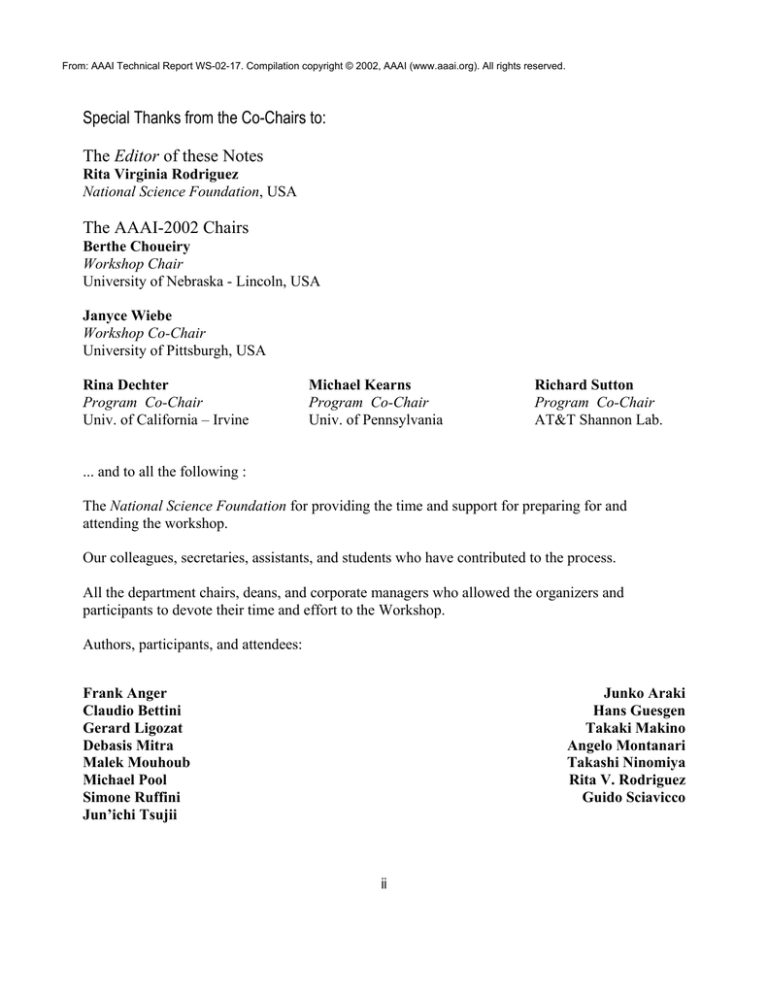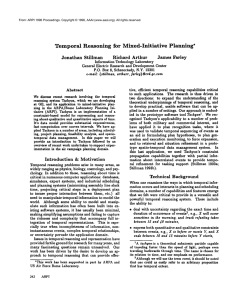
From: AAAI Technical Report WS-02-17. Compilation copyright © 2002, AAAI (www.aaai.org). All rights reserved.
Special Thanks from the Co-Chairs to:
The Editor of these Notes
Rita Virginia Rodriguez
National Science Foundation, USA
The AAAI-2002 Chairs
Berthe Choueiry
Workshop Chair
University of Nebraska - Lincoln, USA
Janyce Wiebe
Workshop Co-Chair
University of Pittsburgh, USA
Rina Dechter
Program Co-Chair
Univ. of California – Irvine
Michael Kearns
Program Co-Chair
Univ. of Pennsylvania
Richard Sutton
Program Co-Chair
AT&T Shannon Lab.
... and to all the following :
The National Science Foundation for providing the time and support for preparing for and
attending the workshop.
Our colleagues, secretaries, assistants, and students who have contributed to the process.
All the department chairs, deans, and corporate managers who allowed the organizers and
participants to devote their time and effort to the Workshop.
Authors, participants, and attendees:
Frank Anger
Claudio Bettini
Gerard Ligozat
Debasis Mitra
Malek Mouhoub
Michael Pool
Simone Ruffini
Jun’ichi Tsujii
Junko Araki
Hans Guesgen
Takaki Makino
Angelo Montanari
Takashi Ninomiya
Rita V. Rodriguez
Guido Sciavicco
ii
AAAI - 2002
W20: Workshop on Spatial and Temporal Reasoning
Welcome to the Workshop on Spatial and Temporal Reasoning at AAAI-2002 in Edmonton,
Alberta, Canada. This workshop continues in the spirit of a series of such activities over the last 10
years in spanning related communities of researchers that study representing and reasoning about
either space or time—or both. In addition, rather than focusing on theory, the workshop has
encouraged a mix of theory and applied work. While a number of central themes recur, a wide
variety of topics typify the workshops.
Various of basic representational problems in space (direction, location, proximity, geometry,
intersection) and in time (coincidence, order, concurrency, overlap, granularity) attract repeated
attention due to their fundamental and difficult nature. Likewise, common reasoning problems
thread their way through many papers on space (path finding, orientation, relative position) and
time (constraint satisfaction, schedule optimization, precedence). Beyond that, however, the
richness of different ontologies, different applications, and different objectives assures that no small
collection of “solutions” will serve to satisfy all needs. The established intractability of many
reasoning problems also broadens the search for approximate and partial solutions.
In this year’s workshop the papers are equally divided between spatial and temporal problems, with
each paper taking on a different aspect of the challenge. Selecting a route, reasoning about angular
directions, and determining if one object contains another occupy the spatial research; dealing with
mixed granularity, solving changing constraints efficiently, and general reasoning via a temporal
logic sum up the temporal research.
The interchange between spatial research and temporal methods has proved fruitful, particularly in
the domain of qualitative reasoning. It is the continued wish of the organizers that the presentations
and interchange in this workshop stimulate cross-fertilization, new applications of known
techniques, and new approaches to well-studied applications. Your attendance at the workshop
indicates your interest in finding computerized solutions to representation and reasoning problems
that deal with space and time, be they geographic or robotic, dealing with transportation or
communication, theoretical or applied.
The contributed presentations include 6 papers divided into 2 sessions: first spatial, then temporal.
These paper sessions are alternated with discussion sessions, providing structured opportunities for
interaction. The breaks, of course, allow more informal venues for exchange.
We hope you come away with a richer knowledge, sharing our view that space and time may serve
as a unifying theme for many areas, and that we may contribute to some standardization of
terminology, principles, and results which cut through so much research.
Frank D. Anger
Hans W. Guesgen
Gerard Ligozat
Rita V. Rodriguez
iii









